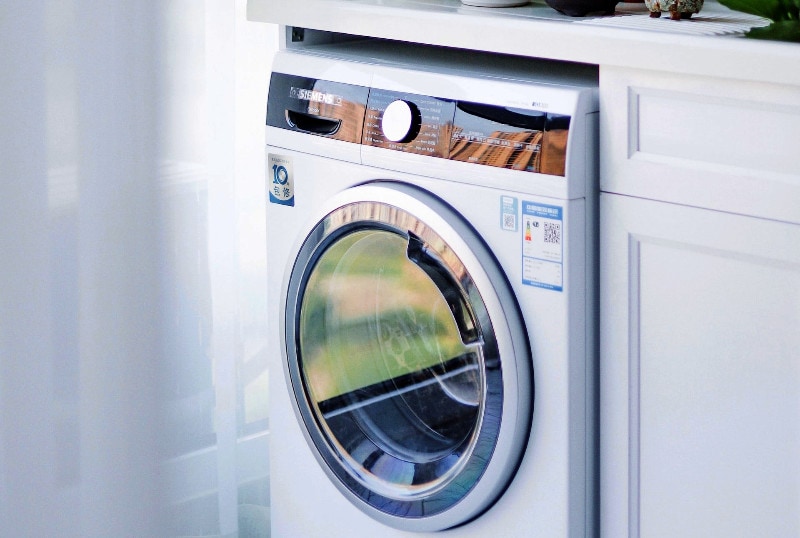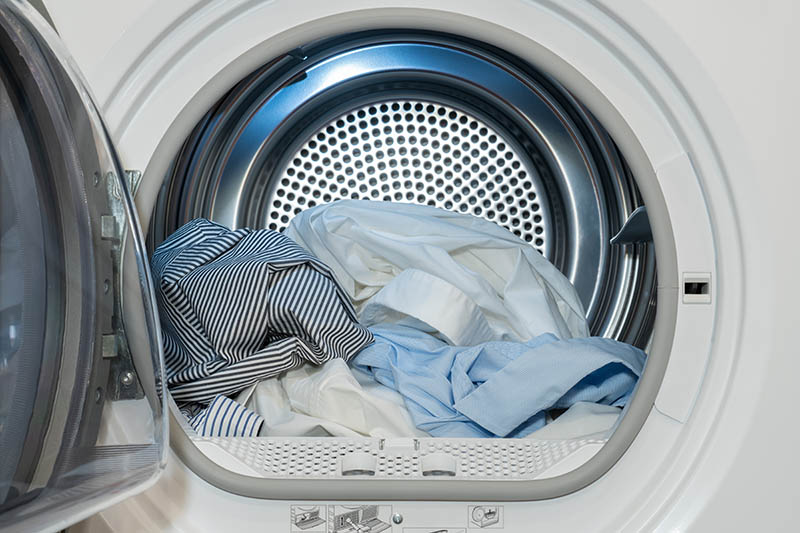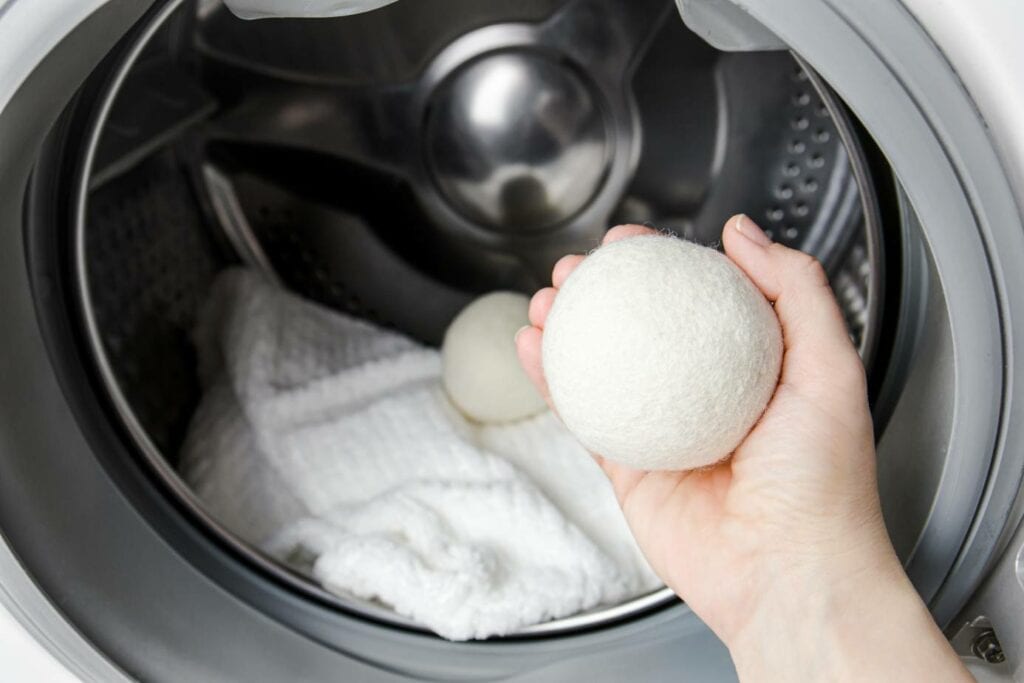How Do Gas Dryers Work? Types, Uses & FAQs
-
Codee Chessher
- Last updated:

Like death and taxes, laundry is inevitable. Finding the best way to wash and dry your clothes will keep them in great shape for longer and cut down on unsightly stains, but how gas dryers work can be a mystery. How do they work, and how do they fare against their electric brethren? Let’s find out the answers to those and more down below.
 What Is a Gas Dryer and How Does It Work?
What Is a Gas Dryer and How Does It Work?
Gas dryers are dryers with both electric and gas hookups. Like electric units, gas dryers use heat to dry your clothes, but they work just a bit differently. Instead of producing heat with electricity, gas dryers use gas to produce heat and dry your clothes. The drum turns and tumbles your clothes all around, and the moisture evaporates into the air.
Gas dryers use electricity to power the fan, control panel, drum, lights, and ignition system. Like other gas appliances, a gas dryer is typically equipped with a pilot light that makes starting the machine easier. By contrast, an electric dryer uses heating elements and a fan to accomplish the same job. The two types of dryers both last around 12 to 14 years.
Propane and natural gas are the two most common fuels used to power gas dryers, but you’ll also need an outlet. Unlike electric models, gas dryers use a 120-volt outlet. Despite using electricity, gas dryers only use half or less of the same power that a solely electric dryer does. Heat is very power-intensive to make, and gas is way more efficient.
Once the pilot light ignites your fuel source, the machine pushes the heat into the drum and circulates it with a fan. By generating more heat more quickly than its electric counterpart, a gas dryer is better at drying large loads of clothing and getting clothes totally dry the first time around.
Like electric dryers, gas dryers have all the same electrical components that keep you safe and the inner workings. These include fuses, a thermostat to regulate temperature, and a control panel for you to start, stop, and change settings on the machine.
Overall, a gas dryer only uses about half of the electricity as a comparable electric unit. The bad news is they’re also more costly upfront, so it may take time to recoup your investment in electricity. Finally, gas dryers tend to require more maintenance over time because they have both electric and gas components.

What Are the Different Types of Gas Dryers?
There are a few major types of gas dryers you’ll see on the market, and which you use depends on what you’re looking for. These include vented dryers, ventless dryers, portable dryers, and commercial dryers. Let’s find out more about the difference between vented and ventless dryers since these are two of the most common.
Vented Dryers
The most common type of gas dryer, these have a vent that runs outdoors to expel fumes and heat. These are a great choice for quickly drying clothes because they reduce the humidity levels inside the drum, wicking away moisture faster. The downside is that they require installing a vent, which may not be possible in all homes.

Ventless Dryers
Ventless dryers are both more convenient than vented models and more of a hassle. They’re convenient because they don’t require running a vent outside, but annoying because of the way they deal with moisture.
Because there’s nowhere to send the hot air and moisture, the machine uses an ingenious condensation technique to turn it into water. The downside is that you have to empty it from time to time, which gets irritating very fast.
Where Are Gas Dryers Used?
Gas dryers are used anywhere people wash and dry clothes. They’re well-liked for being easy on electricity, which can save you money on your monthly bill. The tradeoff is that you pay for propane or gas, which can also get pricey if you dry a lot of clothes.
Generally speaking, we suggest a gas dryer if you’re tired of damp clothes in your old electric unit and want to save a few bucks every month on your power bill. It’s expensive upfront, but it’ll be worth it once you see how toasty dry the clothes come out.

Advantages of Gas Dryers
Gas dryers have some big things going for them, and we doubt they’ll ever truly die out. Let’s summarize the main benefits that a gas dryer brings to the table.
- Dries clothes faster than electric models because of higher heat production
- Multiple types available for different situations
- Only requires a 120-volt outlet
- Uses less electricity than 100% electric dryers
Disadvantages of Gas Dryers
They may dry clothes faster and save electricity, but gas dryers have a few notable drawbacks you should be aware of before you run out and buy one. Look at a brief list below to get a more balanced view.
- Cost more upfront than electric dryers
- It takes time to realize electricity savings
- Requires more maintenance than electric units
- Needs a gas line
Frequently Asked Questions (FAQs) About Gas Dryers
Can You Use a Gas Dryer Without a Gas Line?
Technically, it’ll turn on and the drum will turn, but there won’t be any heat because gas dryers can’t produce heat without gas since they lack heating elements. It’s basically pointless to try because your clothes won’t get dry. We’d suggest having a gas line installed or switching to an electric model.

What Kind of Maintenance Do Gas Dryers Need?
On a regular basis, you’ll have to clean the lint filter and ensure the exhaust vent isn’t obstructed. Once a year, have the gas lines checked to make sure everything’s in good condition. Other than that, gas dryers are typically maintained on an as-needed basis.
How Long Does It Take for Gas Dryers to Dry Clothes?
There are a lot of variables to consider, but a good ballpark estimate is about 45 minutes for a large load of clothes. On average, though, gas dryers can slash as much as half your drying time versus an electric unit. The exact drying time depends on how well your washer spun your clothes, the specifications of your gas dryer, how full the load is, and how clean your lint filter is.
 Conclusion
Conclusion
Gas dryers are an impressive alternative to electric models but require a gas line to work. If you’re interested in saving some money on your power bill and your laundry room is compatible with gas, consider trying a gas dryer to get your clothes dry faster.
Featured Image Credit: Raychan, Unsplash
Contents
 What Is a Gas Dryer and How Does It Work?
What Is a Gas Dryer and How Does It Work?